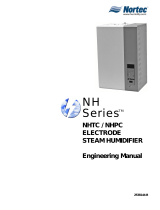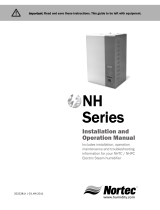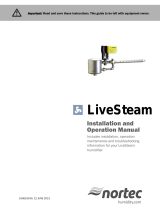Page is loading ...

Help
Help Software
Tutorial
Building a Load Sizing Project with an
SETC Humidifier and a mini SAM-e
Distributor
503-A | 18 AUG 2015

Help Tutorials provide step-by-step examples of complete load sizing
projects and browser projects with the various humidifier and distributor
technologies.
In this tutorial, you will learn how to build a load sizing project with an SETC
Humidifier and a mini SAM-e Distributor
Proprietary Notice
This document and the information disclosed herein are proprietary data of Nortec Humidity Ltd. Neither this
document nor the information contained herein shall be reproduced, used, or disclosed to others without the
written authorization of Nortec Humidity Ltd., except to the extent required for installation or maintenance of
recipient’s equipment.
Liability Notice
Nortec does not accept any liability for installations of humidity equipment installed by unqualified personnel or
the use of parts/components/equipment that are not authorized or approved by Nortec.
Copyright Notice
Copyright 2015, Nortec Humidity Ltd. All rights reserved.

Contents
2 Log In and Projects List
3 Create a New Project
4 Project Home Page
5 Load Sizing Tab
8 Humidifiers Tab
11 Distributors Tab
13 Controls Tab
15 Summary Tab
16 Project Submittals and Requesting a Quotations

1 | Help Tutorial – SETC Humidifier with mini SAM-e

Help Tutorial – SETC Humidifier with mini SAM-e | 2
Log In and Projects List
To begin, start by logging into your Help account. Once completed, hover your mouse over the
Projects tab and then select List all Load Sizing Projects as shown in Figure 1: Projects List. The
Projects list is where all of your projects are stored. Projects are stored in the cloud and are
available from whichever device you choose to access Help with.
There are two types of Projects:
Load Sizing Projects:
Allows you to calculate humidification loads and select product step by
step through a wizard style approach. Selections can be supplemented
by adding product from the Product Browser Catalog.
Browser Projects:
Allows you to create your own Bill of Material with product from the
Product Browser Catalog.
Figure 1: Projects List

3 | Help Tutorial – SETC Humidifier with mini SAM-e
Create a New Project
To create a new project, select the Add icon shown in Figure 2: Create a New Project to add a
load sizing project.
Figure 2: Create a New Project
A dialogue box, as shown below, will appear and request project information. Give the project a
name such as “SETC-050 and mini SAM-e”, set the units to imperial, and set the city to Ottawa
Macdonald-Cartier Int’, Ontario, Canada. Help includes Weather Data for a variety of locations,
setting the city allows Help to use appropriate conditions for your region.
Figure 3: Add Project Dialogue Box
Click Save at the bottom-right when you have finished editing values.

Help Tutorial – SETC Humidifier with mini SAM-e | 4
Project Home Page
You will be redirected to the Project Home Page, shown below. This is the main page from which
your project will be built. Here you can modify the project name, units, dates, weather data and
notes, as well as add Zones.
All product selections that you will make are grouped together in Zones. Zones represent an
area or sub-area in the project being served by a humidification system. Buildings will often
contain multiple Zones.
Your project must contain at least one Zone in order to be complete. To add a Zone, click the
Add button as highlighted in Figure 4: Project Home Page
Figure 4: Project Home Page

Help Tutorial – SETC Humidifier with mini SAM-e | 6
For this exercise, the following settings will be used:
1. Load Size Method: Calculated.
This permits you to enter in air flow and conditions to calculate a load. The alternative, Manual,
allows users to specify a load directly.
2. System Type: Ensure that Duct Humidification is selected
By default Help will select components to distribute steam in duct unless you specify that it will be in-
space.
3. Calculation Method: Isothermal.
Isothermal is used for steam systems, while the two adiabatic options are used for nozzles and
evaporative media systems.
4. Duct Details:
Duct Type: Rectangular
Duct Orientation: Horizontal
Duct Width: 24 inches
Duct Height: 24 inches
5. Air Flow:
Outside Air %: 30%. This is the percentage of the air volume that will be outdoor air. The balance will be
return air from the space.
Air Volume: 4000 CFM
6. Moisture Gains and Losses
Moisture gains: 0 lb/hr
Moisture Losses: 0 lb/hr
7. Outside: Select the Use Weather Data icon
8. Inside:
Temp. Leaving Humidifier: 55
o
F. This is the temperature of air entering the steam distributor in duct.
Space Design Temp: 72
o
F. This is the temperature of the space you are humidifying.
Space Design Humidity: 40% RH. This is the humidity setpoint of the space you are humidifying.
9. Natural Exchange: Leave unselected
10. Use Economizer: Leave unselected

7 | Help Tutorial – SETC Humidifier with mini SAM-e
Scroll down and review the schematic drawing shown in Figure 6: Schematic Drawing. The
Schematic Drawing, Psychrometric Chart, and Parameter table can all be viewed by clicking on
their respective tabs. They provide a graphical representation of the parameters entered above.
Clicking the Export Icon at the top right hand corner of the diagrams will export any of these
documents as either a PDF or CSV file. Only the Parameters section has the option to export
either PDF or CSV. Alternatively, these graphics can be exported from the Project Home Page
under the Document Center tab.
Figure 6: Schematic Drawing
Back at the top of the Load Sizing page, the blue Load Calculations box will have a calculated
humidification load of 34.25 lbs/hr and a duct velocity of 1000 feet per minute. This box
updates automatically as you type values and click other fields on the page.
The Absorption Distance will also show values between 0.50 and 2.49 ft. These values are
presented as a range since the specific distributor used will be configured in a later step.

Help Tutorial – SETC Humidifier with mini SAM-e | 8
Humidifiers Tab
The next step is to select a humidifier. Do this by clicking on the Humidifiers tab as shown in
Figure 7: Humidifiers Tab or by selecting the Next button below Load Sizing. The humidifiers tab
contains a listing of humidifier technologies that match your selections and load from the Load
Sizing Tab.
Figure 7: Humidifiers Tab
The humidifiers tab contains a listing of humidifier technologies that match your selections and
load from the Load Sizing Tab.
For this tutorial, select Steam Exchange as the humidifier. Steam Exchange humidifiers utilize
steam from a central facility boiler as primary energy source to boil water from a domestic
source. The result is clean, chemical free humidification steam at atmospheric pressure.
Steam Exchange humidifiers are commonly used in hospitals, art galleries, and other facilities
where humidification steam must be free from boiler chemicals.
A Choose Humidifier dialogue box will appear asking for you to enter the Steam Pressure in
pounds per square inch gauge (psig). Acceptable values range from 5 psig to a maximum of 15
psig. The performance of the Steam Exchange humidifier depends largely on the steam
pressure supplied, pressures less than 15 psig will reduce the output below the rated capacity
of the model. Help will automatically calculate the output of the humidifier at a given steam
pressure and make recommendations accordingly.
For this project enter a steam pressure of 15 psig and select Get Humidifier Recommendations.
Help will highlight the 50 lbs/hr model in green as the recommended choice. You do not always
need to follow Help’s recommendation; users are free to select any humidifier model from the
list. In this case, follow Help’s recommendation and select the 50 lbs/hr model.

9 | Help Tutorial – SETC Humidifier with mini SAM-e
The dialogue box will expand, enabling you to increase the quantity (commonly used for
redundant unit applications) and select the control type. For this capacity of humidifier, there
are two models available:
1. Indoor Total Control (SETC) models are the premium SE Series humidifier and feature the
“Total Controller”, and advanced microprocessor based controller that allows for detailed
controls and integration with a building automation system.
2. Indoor Proportional Control (SEP) models are economical models that feature a very
simplified electronics and controls package. They do not have a display, accept fewer
control signals, and do not support 2 way communication with a building automation
system.
For this tutorial, select a quantity of 1 humidifier and set the model type to Indoor Total Control.
Click Save to proceed.
The humidifier will be added to the Bill of Materials. In this example, the humidifier will require
several options to comply with requirements from the consulting engineer designing the project.
Humidifier specific options are edited by clicking on the Edit Options button shown in Figure 8:
Humidifier Bill of Materials and Options.
Figure 8: Humidifier Bill of Materials and Options

Help Tutorial – SETC Humidifier with mini SAM-e | 10
Selecting this icon will cause another dialogue box to appear containing compatible options with
this humidifier as well as the correct quantity. Each humidifier listed on the Humidifiers tab can
have its own unique set of options and would need to be configured individually.
For this specific unit, select Seismic Kit for SETC 050 by checking the box and clicking Save as
shown in Figure 9: Humidifier Options. The selected option will now be added to the previous
humidifier bill of materials.
Figure 9: Humidifier Options

11 | Help Tutorial – SETC Humidifier with mini SAM-e
Distributors Tab
The next step is to add a distributor. Do this by clicking on the Distributors tab at the top of the
page as shown in Figure 10: Distributors Tab or by selecting the Next button at the end of the
previous step. Help will present distributor options compatible with your project. Available
options will vary with duct geometry, load, and humidifier type specified.
Figure 10: Distributors Tab
For this tutorial, an absorption distance of 12” or less is required. Select a mini SAM-e Short
Absorption Manifold by clicking on the blue button. Mini SAM-e models are special short
absorption manifolds specifically designed to enable short absorption in smaller ducts.
A new dialogue box will appear allowing you to configure your mini SAM-e as shown in Figure 11:
Mini SAM-e Configuration.
Figure 11: Mini SAM-e Configuration

Help Tutorial – SETC Humidifier with mini SAM-e | 12
Select the following options:
1. Select Distributor Based On: Zone Load.
The capacity will be matched to the humidification load. Alternatively, the distributor capacity
can be matched to the humidifier capacity.
2. Tube Spacing: 6 inches.
It is best practice to select the widest spacing that meets your available absorption distances.
Wider tube spacing will result in few tubes minimizing both costs and heat losses.
3. Insulation: Check box.
Insulation covers both the header and steam tubes minimizing heat transfer and improving
system efficiency.
4. Inlet Adapter: Automatically Select.
Help will automatically match an inlet adapter to your selected humidifier. Alternatively, you may
prefer to specify your own inlet adapter.
Click Save when you are done and Help will generate a Bill of Materials. You may review this list
as well as edit and make changes using the icons at the top right hand corner of the list.
Scrolling further down the page, the Distributor Configuration section provides information
about the distributor as well as a drawing of the SAM-e.
Clicking the PDF icon will export this drawing to a PDF file. Alternatively, the distributor drawings
can be accessed from the Document Center tab on the Project Home Page.
Select Next when you are finished.

13 | Help Tutorial – SETC Humidifier with mini SAM-e
Controls Tab
You will now be directed to the Controls tab. Clicking on the Controls tab at the top of the page
will also bring you here. The controls tab allows you configure controls for your project. Controls
are optional, so this step can be skipped if controls will not be provided.
There are two options:
1. Controls by Nortec configures a complete control package provided by Nortec.
2. Controls by Others configures a control package with the primary control signal coming
from another source such as a building automation system. In either case safety
switches and building automation gateways can be included.
For this tutorial, select Controls by Nortec with Assisted Selection. A controls package will be
configured with a single wall mounted sensor located in the space; providing sensed relative
humidity levels to the humidifier. The set point for the space will be controlled directly on the
humidifier keypad. A high limit humidistat and air proving switch will be included as safety
controls. The high limit stat will prevent duct humidity levels from exceeding levels where
condensation could occur, while the air proving switch will ensure that air is flowing in duct.
Make the following selections as illustrated in Figure 12: Controls Configuration:
1. Signal Type: Transducer.
Transducer signals report the relative humidity in the space to the humidifier. The humidifier
uses an internal proportional – integral (PI) loop to determine the output. This is in contrast to
demand signals which simply instruct the humidifier to operate at a given percentage.
2. Channels: Single.
Select whether you will have one or 2 modulating control signals controlling the humidifier. The
humidifier will operate until the first signal has been satisfied before becoming idle.
3. Channel 1 Location: Wall.
Select whether you would like the humidistat to be a wall mounted or duct mounted model. For
this example, the primary humidistat will be located on the wall in the conditioned space.
4. Outdoor Temperature Sensor: None.
The outdoor temperature sensor connects to a humidistat. It will allow the humidistat to reduce
the space humidity level in response to cold outdoor temperatures minimizing the risk of
condensation on windows.
5. Include Air Proving Switch: Check box
This on/off safety device prevents humidifier operation unless air is flowing in the duct.

Help Tutorial – SETC Humidifier with mini SAM-e | 14
6. Include On/Off High Limit Switch: CHECK.
This on/off safety device prevents condensation in the duct by stopping humidification if the duct
humidity levels exceed a certain level.
7. Building Automation System Gateway: None.
Select a protocol for a building automation gateway card if desired.
8. Nortec OnLine Monitoring: None.
Humidifiers with a Total Controller (TC) or Integrated Controller (NH-EL models) are capable of
being remotely monitored through the internet. Select this option to include a gateway card
enabling this feature (TC models only, standard feature on Integrated Controller Models).
Figure 12: Controls Configuration
Selecting Generate will update the Controls Bill of Materials found below.
Click Next to complete the selection.

15 | Help Tutorial – SETC Humidifier with mini SAM-e
Accessories
The next step allows you to add accessories to the current Zone. Selecting the Next button on
the previous page will bring you to this step or you can choose the Accessories Tab for the
navigation Bar at the top of the page.
Here you have the option to add any common accessories such as water filters and condensate
pumps, as well as view the bill of materials for the Zone.
For this tutorial, a drain water cooler will be selected to comply with local plumbing regulations.
Add an accessory to your project by clicking the green plus sign to the left of the chosen
accessory, shown below in Figure 13: Accessories. Add one “Drain Water Cooler, Self-Actuated”
and you will see it added to the Parts and Accessories Bill of Materials list at the bottom of the
page.
Figure 13: Accessories

Help Tutorial – SETC Humidifier with mini SAM-e | 16
Selecting the Show Details icon, shown in Figure 13: AccessoriesError! Reference source not
found., beside an accessory name will expand its window and allow you to view a description of
the part as well as any related schematics.
This will also give you access to three other icons listed below:
Information Icon: Redirects to the Nortec product’s webpage.
3D Models: Redirects to Nortec’s AutoDesk Seek site, where Revit models, manuals
and dwg files can be downloaded.
Product Document Exporter:Exports a packacing containing this information. Useful for
generating product cut sheets and PDFs of relevant info.
Select Next once you have finished adding any desired accessories.

17 | Help Tutorial – SETC Humidifier with mini SAM-e
Summary Tab
You will now be directed to the Summary Tab. Clicking on the Summary tab in the Navigation
Bar at the top of the page will also bring you here.
Here you will see a complete bill of materials for the entire Zone shown in Figure 14: Zone
Summary.
Figure 14: Zone Summary
The product selection for this zone has now been completed.
Select the Done button to return to the Project Home Page.
/








